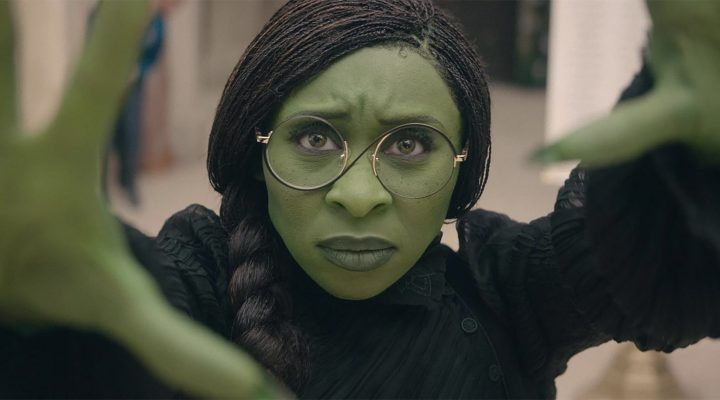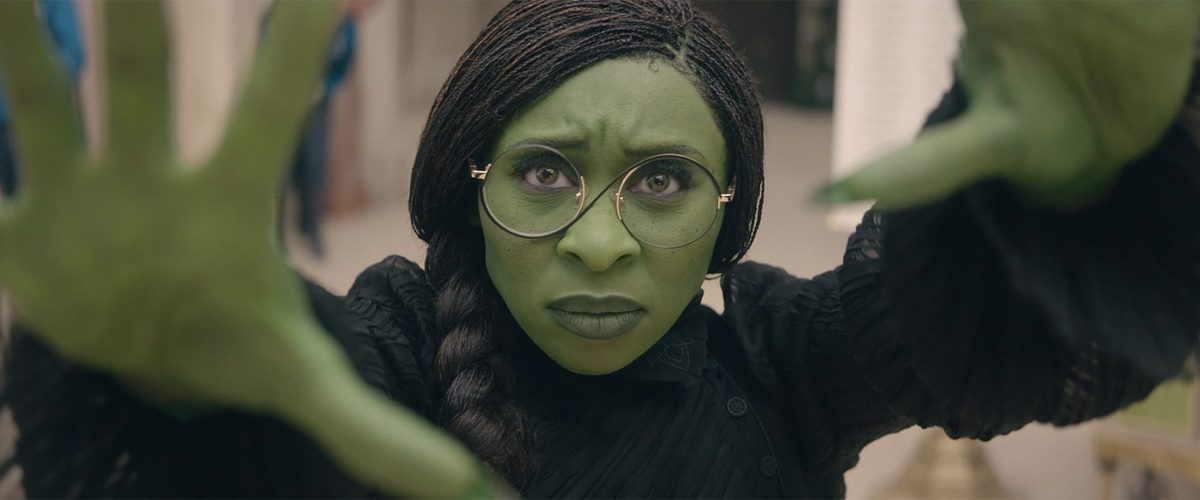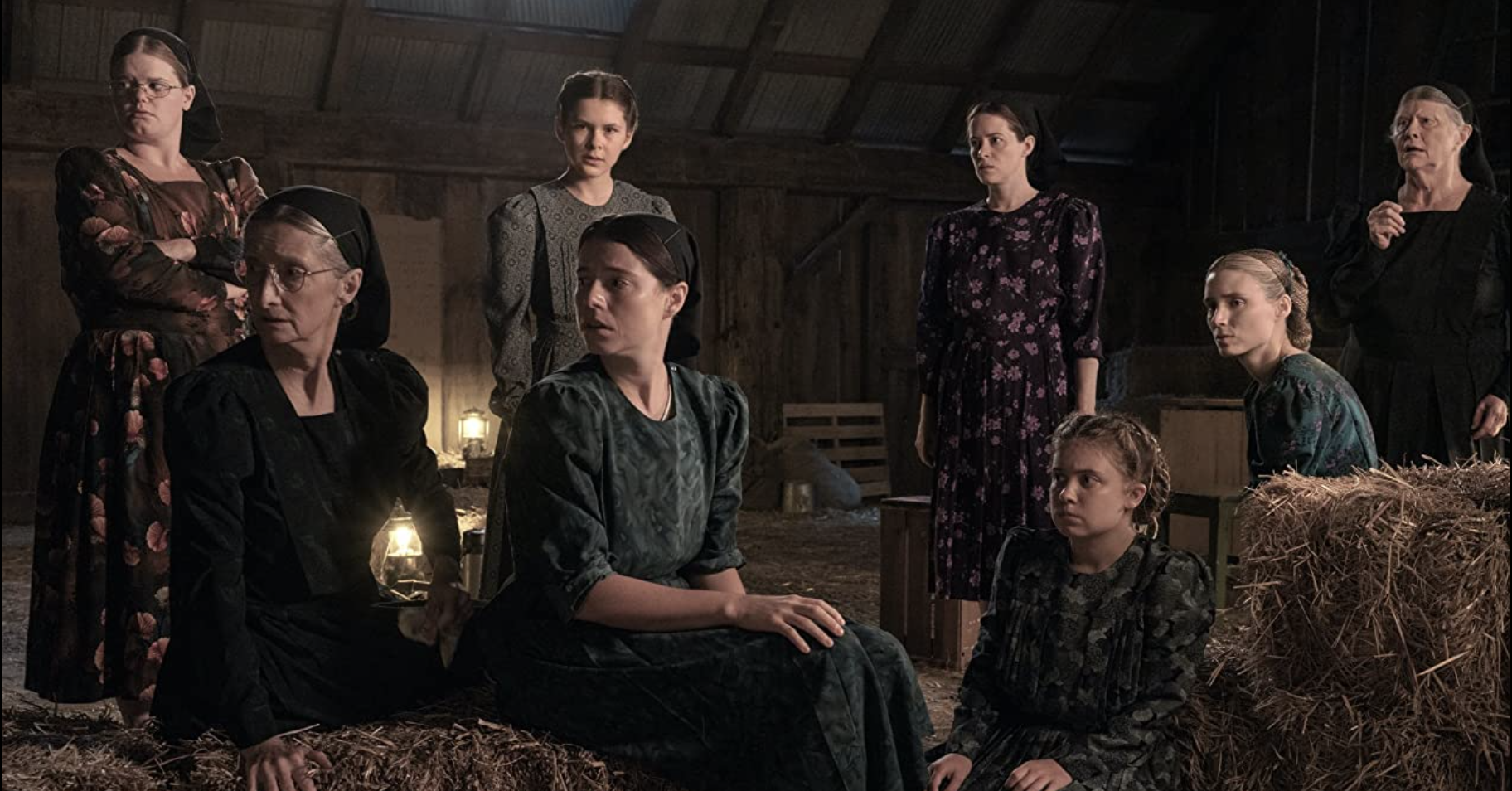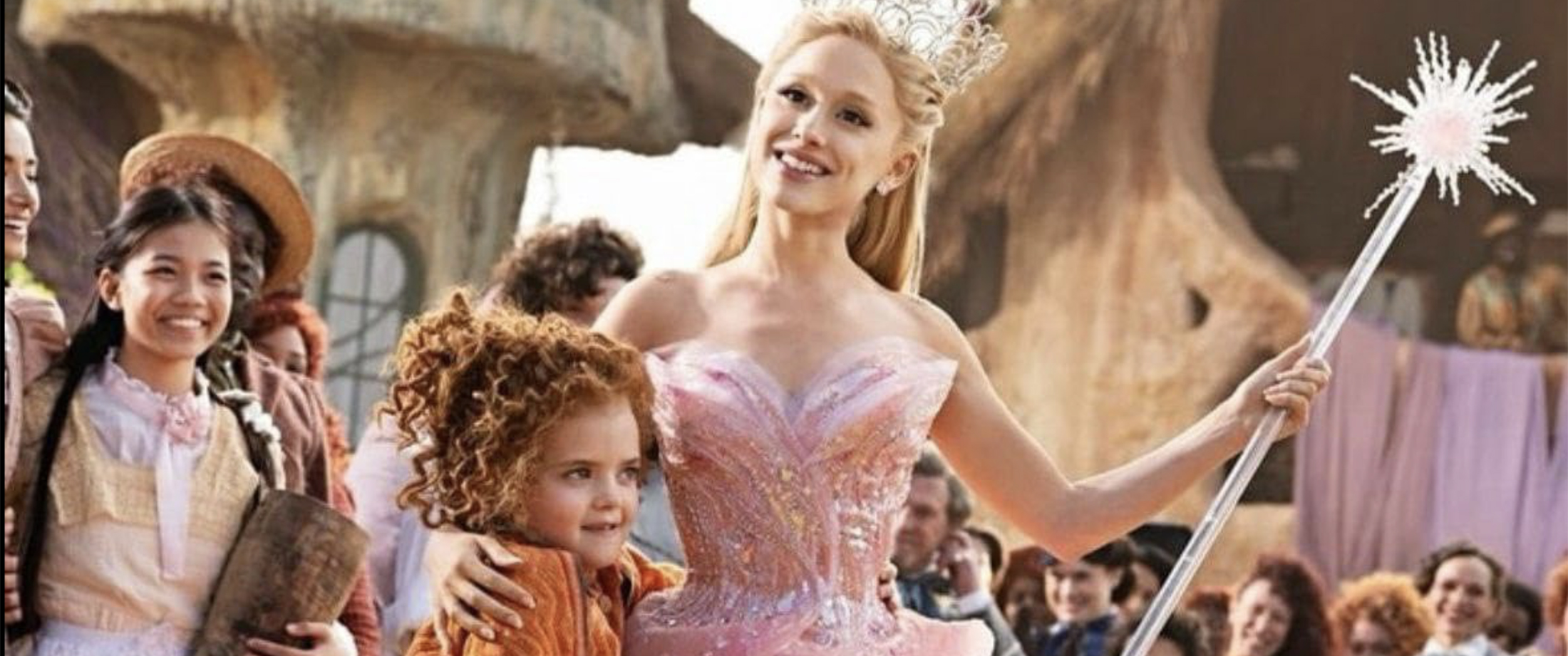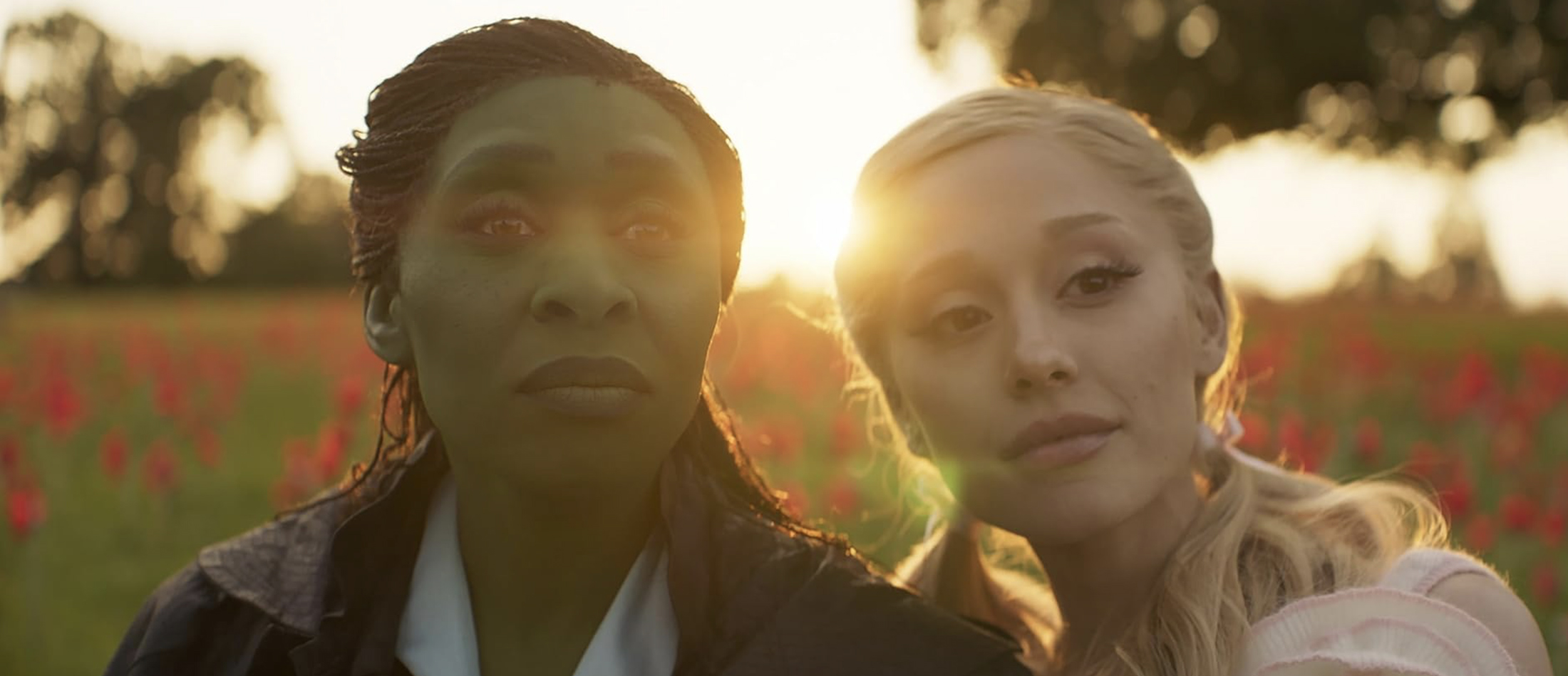One of the most noteworthy theological trends in 21st-century pop Calvinism has been the rehabilitation of the patriarchy. From Josh Howerton to Mark Driscoll to John MacArthur and more, iconic pastors are now routinely given platforms and sympathetic backstories that attempt to complicate categories of good and evil. This has dovetailed with the rise of the “glory plot” and a narrative fixation on how dehumanizing choices (let’s just call it “patriarchy”) can be explained by the gospel.
In case you haven’t noticed yet by my purposefully plagiaristic introduction, this is a response to The Gospel Coalition’s latest diatribe against the movie Wicked. Based on the stage musical inspired by the 1939 film The Wonderful Wizard of Oz, Wicked tells the story of Elphaba Thropp, otherwise known as “the Wicked Witch of the West.” Part One follows Elphaba from being born green to meeting Galinda the Good and eventually the Wizard. Part Two will be released in December 2025.
I probably could get a head start in writing articles for 2025 simply by checking out what movies are scheduled to release. There’s nothing more predictable than TheoBros writing negative reviews about movies that explore healing from the trauma caused by patriarchal men and the institutions they build that use and abuse people. And Brett McCracken’s review of Wicked for TGC is perhaps the clearest example yet that contemporary pop Calvinists struggle with the category of evil.
Brett McCracken’s back story
As a refresher, McCracken is the guy who was fuming in 2023 over the movie Women Talking, which was based on a true story about 100 Mennonite women who were being raped by eight Mennonite men. When the women woke up with bruises and bloodstained beds, the men claimed the assaults were part of their “wild female imagination” and possibly the work of demons. Women Talking shows the women discussing amongst themselves whether they should stay and fight or leave, and what the implications of leaving their faith community might have on their eternal souls.
According to McCracken, however, the movie was “an advocacy piece — celebrating the virtues of feminism, collective action and liberation for women and LGBT+ people in a cisgender, patriarchal world.”
In other words, McCracken feels insecure about patriarchy’s image. So he dismissed Women Talking because it causes Christianity to be “seen more as an oppressor than a liberator.”
Then he demonized Women Talking as showing “previously silenced women now having the power to speak into being whatever reality they desire.”
“He’s doing so as part of a long pattern of wanting to silence and subjugate women while defending the power of a penis-centered patriarchy.”
The next month, when Josh Butler released his book Beautiful Union, in which he said a man giving the gift of his semen “not only upon but within his wife” is a picture of Jesus giving the Bible to the Church, McCracken called it “the Protestant magnum opus on sexual ethics we’ve been waiting for.”
So when McCracken fusses about Wicked, he’s doing so as part of a long pattern of wanting to silence and subjugate women while defending the power of a penis-centered patriarchy.
No one mourns the wicked
Wicked opens with the scene from The Wonderful Wizard of Oz where the Wicked Witch of the West’s hat is lying on the ground in a puddle of water after getting doused by Dorothy. Then all of Oz begins celebrating, “Good news! She’s dead!”
Munchkinland breaks out into song, “Let us be glad! Let us be grateful! … No one mourns the Wicked! No one cries, ‘They won’t return!’”
Instead, the Munchkins celebrate how good conquered evil, as they roll out a wooden statue of Elphaba and set it on fire.
Interestingly, McCracken doesn’t reflect on this point at all. Instead, he claims the movie opens with the question, “Why does wickedness happen?” And to be sure, that’s an important question. But watching people celebrate justice as violent retribution against an enemy can’t be missed here, especially in light of white evangelicalism’s “comfort-prioritizing complicity” in the reelection of Donald Trump.
Last Christmas, Trump declared of his opponents, “May they rot in hell … Merry Christmas!” Then Charlie Kirk called for Trump’s political opponents to receive the death penalty and suggested we have Coca-Cola-sponsored public decapitations for kids to watch. Founders Ministry president and Southern Baptist pastor Tom Ascol later began announcing, “Kamala Harris is going to hell, … (Anne) Branigin is going to hell, Jake Tapper is going to hell.”
And lest the pop Calvinists at TGC think they’re above this, they’re part of an entire tradition going back to St. Augustine of Christians celebrating the violent suffering of the wicked in hell.
To men like McCracken who view reality as a glory hierarchy of authority and submission, justice isn’t the liberation or healing of the oppressed. Instead, the patriarchy is good and justice is patriarchy’s top down conquest through violent retribution against the supposedly wicked who won’t submit.
What is wickedness?
“It’s no doubt intentional that Elphaba is played in the film by a queer Black woman,” McCracken writes. “Her character doesn’t neatly fit mainstream society’s binaries and norms. And as the story progresses, she becomes a freedom fighter for the oppressed, a ‘villain’ only insofar as those in power mischaracterize her cause.”
All three of those features he names about her are important. As a woman, she is below men in the hierarchy. As a Black person, she is below white people in the hierarchy. And as a queer person, she doesn’t submit to white evangelical patriarchy. So she is on the underside and outside the patriarchy’s hierarchy.
Then McCracken complains: “If Wicked finds wickedness anywhere, it’s not in Elphaba. Rather, it’s in Oz’s privileged power structures … and others who gain power by using and abusing the less fortunate.”
He goes on to argue that Elphaba’s flaw is caring “too much,” and that she “can’t turn a blind eye to injustice.” And regarding the film’s definition of wickedness, McCracken accuses the film of claiming “entire classes of people are culpable for their willful ignorance; guilty on account of their naive, comfort-prioritizing ‘complicity’ in an evil system.”
In the world of patriarchy, apparently queer Black women not only are not allowed to be portrayed in film, but they aren’t allowed to be employed either. But why would McCracken care? The only reason mainstream society has such binaries and norms is that patriarchal men like McCracken have shaped our society under their boot of control that depends on clearly defined racial and gender binaries.
If anything, Wicked is providing a prophetic service to society by demonstrating how evil is defined in the privileged power structures of patriarchy by “using and abusing the less fortunate.” And as we’ve seen in the authoritarian Christian obsession with promoting Trump in order to conquer their neighbors, white evangelicalism, radical Catholicism and independent charismaticism are complicit in a naive, willfully ignorant promotion of evil.
But rather than reflecting on how Wicked might be an opportunity for discussing white evangelicalism’s embrace of Christian nationalism, McCracken wants to defend the patriarchy’s image.
It’s beyond ironic that the men of TGC would miss this basic reality. The fundamental wound of Israel in Scripture is their fear of, experience in and recovery from exile. Beginning in the book of Genesis, the way the stories are written are marked with the wounds of Babylonian exile. You simply cannot have a clue what the Bible is talking about or what Jesus referred to in his parables if you don’t recognize how the power structures of empire used and abused the less fortunate.
“Patriarchy can’t consider these things because of its dependency on biblical inerrancy.”
But patriarchy can’t consider these things because of its dependency on biblical inerrancy as a top down revelation that bolsters their top down authority. When the Bible as empire is deconstructed, then the Bible itself becomes a “trauma plot” written by those on the underside of power who are processing how they’ve been used and abused by Babylon. And that’s exactly what McCracken dismisses Wicked as being.
Why? Because he and The Gospel Coalition are Babylon. So they are the wicked.
For Christians to recognize the harm empire causes would be to notice patterns of how empires look down on, silence and cage those they use and abuse. And this is why TGC and other complementarian Calvinist businesses parading as ministries warn against empathy and listening to those on the underside and outside of their empire. It’s why McCracken is so concerned about Elphaba being played by a queer Black woman. And it’s why he reacted so strongly against the women who liberated themselves in the movie Women Talking.
In patriarchy, white alpha males have to be the messiahs.
Defying gravity
McCracken’s closing complaint is that Wicked casts Elphaba as “a post-Christian messianic hero more than a depraved villain,” and thus is “rejecting higher authorities and moral norms.”
He thinks the men of TGC should be the higher authorities, and their declarations the moral norms. And of course, all this is to maximize the glory at the top of their hierarchy.
Because patriarchy defines goodness, wickedness and justice from the top down, McCracken seems to define gravity from the top down.
He says: “Gravity is an inescapable law of the universe. It can’t be defied without consequences. Universal laws and limits exist, no matter how forcefully we sing, ‘Unlimited!’ God’s creation has a ‘grain,’ and going against the grain always leaves you with splinters.”
The lyrics of the song he’s criticizing say, “I’m through with playing by the rules of someone else’s game. … I’m through accepting limits ’cause someone says they’re so.”
In Elphaba’s world, freedom comes by accepting the truth at the core of who she is, which includes rejecting the lies those in power declare over her.
And that’s precisely the problem with TGC and McCracken. They think gravity is a top down force that keeps everyone down in their place. But that’s not how gravity works.
Gravity is based on centeredness. The center of the earth draws the center of everyone on it, just as the center of the sun draws the center of the earth.
“Once you realize how gravity actually works, you’re free to cultivate your own healthy centeredness and then fly.”
Once you realize how gravity actually works, you’re free to cultivate your own healthy centeredness and then fly, explore and dance through life with others who are living from their healthy center as well.
But McCracken can’t accept this due to how it subverts the power of patriarchy’s two-dimensional top-down universe. And that’s why pop Calvinists never will understand the nature of evil in any coherent or helpful way. We live in an embodied world that needs an embodied healing. And to the patriarchy, to accept the language of embodiment and trauma would completely subvert their power.
So instead, they’ll spend December celebrating Christmas as the incarnation of God embracing embodiment, while they attempt to rehabilitate patriarchy, without having any self-awareness of the irony.
Rick Pidcock is a 2004 graduate of Bob Jones University, with a bachelor of arts degree in Bible. He’s a freelance writer based in South Carolina and a former Clemons Fellow with BNG. He completed a master of arts degree in worship from Northern Seminary. He is a stay-at-home father of five children and produces music under the artist name Provoke Wonder. Follow his blog at www.rickpidcock.com.

